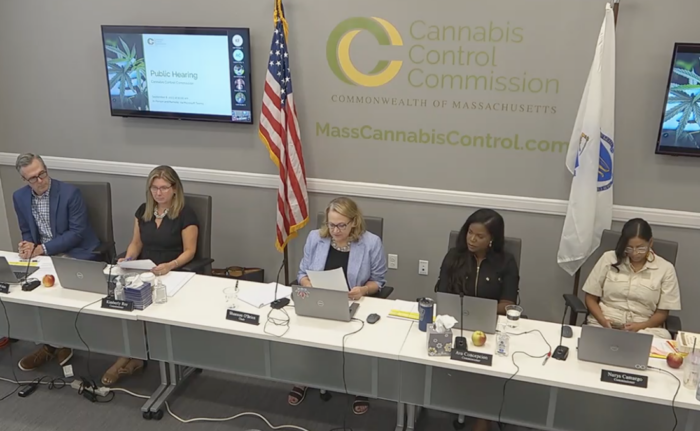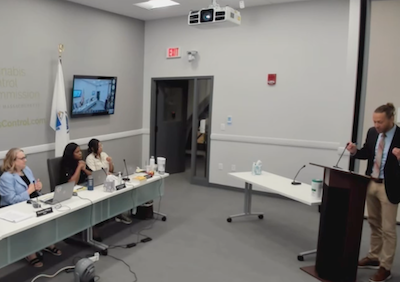
Cannabis Control Commission hearing on Host Community Agreement rule changes gets existential. “You’re going to allow a host community to end relations with a marijuana establishment just because they don’t want to comply with the new law?”
Reporting by Chris Faraone and Zack Huffman
There’s never a dull moment at the Massachusetts Cannabis Control Commission. Struggles become battles and then wars in the weed business, and Friday’s public hearing for people to testify in response to proposed draft regulation changes brought the usual fury and fireworks.
The extensive rewrite was set in motion last year, when state lawmakers passed An Act Relative to Equity in the Cannabis Industry (Chapter 180) requiring the CCC to draft new regulations that, among other changes, improve municipal transparency and accountability. The proposed tweaks, which were first presented at a meeting of the commission on July 14 then advanced into a public comment period two weeks later, include a mandate for the CCC to review every Host Community Agreement (HCA) between municipalities and operators in their borders, and for host communities to only assess so-called “impact fees” based on actual costs incurred as a result of the operation. Municipalities would also be limited to collecting no more than 3% of gross revenue, and would not be allowed to charge businesses predetermined amounts in fees.
“It’s important that the terms of these agreements are fair and equitable,” Commissioner Kimberly Roy said in July. Along with Commissioner Ava Callender Concepcion, Roy led a regulatory working group through the summer to gather input from stakeholders. She added, “Host communities may also no longer use community impact revenue for attorneys’ fees and judicial disputes. They may only be used to offset actual costs.”
Nearly 50 people signed up to testify about the proposed regulations on Friday, with more than a dozen showing up in person to commission headquarters in Worcester. Criticism came from multiple angles, starting with the voices representing towns and cities. In short: despite having been investigated, criticized, and in some cases sued for the abusive terms and fees they arranged to collect from leaf-touching companies, many local governments are not about to give up money, power, and respect without a fight.
“The concerns I have heard from my colleagues are that rules are coming into effect which would affect our contracts which were negotiated in good faith and many times with corporate interests that have a budget that quintupled the budget of our entire town.” Athol Town Manager Shaun Suhoski stressed that municipal attorneys don’t believe the intent of the 2022 law is for HCA rule changes to be retroactive: “We are very concerned looking at the draft regulations that all of these contracts which would have sunset in five years anyway under the prior law now will be subject to a state agency review to comply with new rules.”
Suhoski warned that the rewritten language could spur “600 lawsuits,” and claimed all town and city negotiations are being unfairly compared to the actions of Jasiel Correia II, the former mayor of Fall River who was caught soliciting bribes from cannabis companies in exchange for HCA approval. “I feel like municipalities were painted in a bad light because of a corrupt mayor that made headlines everywhere. Well, that’s not the colleagues that I know. That’s not what local officials that I am familiar with do.”
Also offering the town and city perspective, Massachusetts Municipal Association Legislative Analyst Ali DiMatteo added, “We believe that we all want to get to the same place, but we do not believe that these draft regulations are the way to get there. We are continuously frustrated by the language in the regulations subjecting hundreds of existing HCAs retroactively.” Basically, the MMA wants signed HCAs to stay in place and they’re willing to throw down like the other MMA to stop the changes on the table.
Devin Alexander, a co-founder of the Newton delivery company Rolling Releaf, called bullshit on the stated intentions of balking local governments. “There are certain associations that claim they are for equity,” he said, “but that’s just a lie. It’s all talk.” Addressing the commissioners, he added, “They are nervous over this new reform and they say it has not been done properly, but that’s not true. You have done a great job.”

Appreciation aside, Alexander decried the proposed six-month gap between the promulgation of a final version of the new rules this November and the CCC’s planned date to start enforcing them six months later. And in her turn, Alissa Nowak of Lucky Green Ladies suggested adjustments that would shift more of the HCA burden onto the towns and away from applicants. A Social Equity program participant who has spent $30,000 on attorneys negotiating an HCA that her company still hasn’t obtained, Nowak said “the commission should grant a waiver to operators if host communities are not compliant with the new law and don’t want to be compliant with the new law.”
The prospect of a town or city leveraging the new rules to punish a business they dislike, she added, is “extremely damaging.” Nowak continued, “You’re going to allow a host community to end relations with a marijuana establishment just because they don’t want to comply with the new law? What about cannabis operators, especially Social Equity and Economic Empowerment operators, who spent their entire life savings on this endeavor? If there is a failure to submit a compliant HCA, there should be a penalty to the host community until they do submit a compliant HCA.”
Others joined the chorus. Lucas Thayer, a Social Equity applicant in the throes of the licensing and buildout process, said, “HCAs are extortion. It’s too much for operators to be required to pay rent for months with no plants in the ground just to get that HCA.” Cannabis patient, reporter, and industry watchdog Grant Smith Ellis reminded CCC members that many existing HCAs are basically “contracts negotiated sans oversight by any level of elected or appointed state government in the Commonwealth of Massachusetts.”
Caroline Pineau, whose Stem dispensary is suing its host community of Haverhill over impact fees, said that whatever the new rules end up being, “operators will need clarity on any changes and on what happens during the transition period.” She gave the example of an HCA that is due for renewal before the adjustments are activated.
Nicholas Obolensky, a Rhode Island-based attorney who has worked with several applicants in Mass, dropped the hammer, arguing that HCA rule changes should be retroactive and rebutting claims by town lawyers and flacks. “When I hear municipalities [claim they are] negotiating in good faith I laugh, because almost all of my clients have been over a barrel. I have been routinely pushed back on to provide waivers if the towns need to quantify or document its costs, waivers of the right to dispute the fees.”

Since the new law passed, Obolensky added, “I’m still being confronted with municipalities pushing back on these amendments and asking operators to waive certain aspects of the revised law and asking them to sign separate contracts like [a memorandum of understanding] to circumvent the requirements. … I have clients who signed HCAs prior to the law becoming effective, but that are not yet operational, and the municipalities are refusing to amend the HCAs signed prior to the law change to comport with current law. What makes this more egregious is that some of those same municipalities are seeking to take advantage of the benefits of the amended legislation, but they’re not giving the same benefits to the operators. I find it disgusting, I find it bad faith.”
Asked about the possibility of select boards or town councils using new HCA rules to not only keep hustling operators but perhaps also to shutter them, CCC Commissioner Ava Callender Concepcion said, “That’s something that stood out to me [during the hearing]. I do have more questions about it.”
Concepcion continued, “It takes an incredible amount of resources, time, and energy just to get up and running. To invalidate those existing situations and locations—it does cause a large amount of concern. I need to look into it more. I need to understand if that is something that is a concern that will actually happen. I have to gather more information.”
Commissioner Roy added, “I think an area of concern is if a host community will discontinue relations or not negotiate or renegotiate. … We want to make sure we’re taking into account all unintended consequences or possible consequences of this. It’s not a new concept, but I definitely think it’s one that needs revisiting.”
CCC Chair Shannon O’Brien said the idea of cities and towns evicting unwanted businesses is “concerning.” “That was a data point that was troubling to me and new to me,” she said. “That was surprising and, yes, I’m going to be spending some time looking at that.”
While most testimonies addressed HCAs directly, some participants spoke on the related municipal equity piece. Shaleen Title, a former CCC commissioner who co-founded the nonprofit Parabola Center think tank to work on these issues, said, “Cities and towns … have to create an equity plan—with goals, programs, measurements … That’s all appropriate, but what’s missing is a process to review and approve those plans initially as well as every year or periodically to make sure that the data is being collected and that the plan is proceeding.”
The group Equitable Opportunities Now (EON) submitted a lengthy written testimony addressing various proposed changes including “municipal equity regulatory enhancements” like “strengthening [the] equitable municipal licensing ratio policy.”
EON wrote: “We were encouraged that [the CCC] established both incentives and limited requirements for municipalities to implement minimum required ratios for social equity businesses to non-equity businesses, as the City of Boston has done in preserving a one-to-one ratio within its local licensing process, but urge you to leverage the mandates and powers granted by the legislature to take a meaningful step forward in advancing equity through municipal licensing.”
The public comment period on these changes closed at 5pm Friday. Per the CCC, “final versions will be filed with the Secretary of the Commonwealth’s office no later than Oct. 13, with the aim of promulgation by Nov. 9, in compliance with Chapter 180.”

























